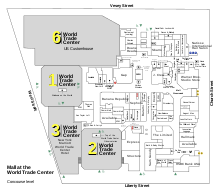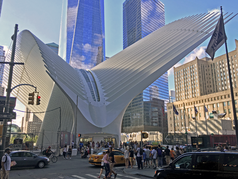Westfield World Trade Center
 The portion of the mall inside the Oculus | |
 | |
| Coordinates | 40°42′41″N 74°00′43″W / 40.71139°N 74.01194°W |
|---|---|
| Address | 185 Greenwich Street, Manhattan, New York, U.S. |
| Opening date | August 16, 2016 |
| Management | Unibail-Rodamco-Westfield |
| Owner | Port Authority of New York and New Jersey |
| Architect | Santiago Calatrava |
| No. of stores and services | 116 |
| Total retail floor area | 365,000 square feet (33,900 m2) |
| No. of floors | 2 |
| Public transit access | NWK-WTC HOB-WTC at World Trade Center |
| Website | |
| World Trade Center |
|---|
| Towers |
| Other elements |
| Artwork |
| History |
Westfield World Trade Center[1] is a shopping mall at the World Trade Center complex in Manhattan, New York, which is operated and managed by Unibail-Rodamco-Westfield. The mall opened on August 16, 2016, as the largest shopping complex in Manhattan, with 125 retail spaces. It replaced The Mall at the World Trade Center, the underground shopping mall under the original World Trade Center, which was destroyed on September 11, 2001.
Original mall (1975–2001)
[edit]
 View of the main entrance to The Mall at the World Trade Center (WTC 4) from Liberty Street in 2001 | |
| Opening date | 1975 |
|---|---|
| Closing date | September 11, 2001 |
| Owner | Port Authority of New York and New Jersey |
| No. of stores and services | ~80 |
| No. of floors | 2 (Plaza and Concourse level) |
| Website | panynj.gov/wtcmall panynj.gov/wtc/wtcsfram.HTM |
The Mall at the World Trade Center was an indoor underground shopping mall that was located in the concourse area of the original World Trade Center complex which was destroyed on September 11, 2001.
Most of the mall was located underneath 4 and 5 World Trade Center, as well as under the Austin J. Tobin Plaza. Completed in 1975, it was the largest shopping mall in New York City, and was managed by the Westfield Group. The main entrance was located on the south side of 4 World Trade Center facing Liberty Street with escalators going down into the concourse. The other entrance was located on the east side of 5 World Trade Center facing Church Street. The mall was also accessible from the lobbies of the Twin Towers, and it served as the point of access or transfer to the Chambers Street–World Trade Center subway station on the A, C, and E trains. PATH trains intersected in the basement levels, which were located under the mall.
The mall included eateries as well as approximately 80 stores, including Borders, Banana Republic, Coach, The Children's Place, Tourneau, J. Crew, Cole Haan, Sephora, Duane Reade, Gap, Sam Goody, Victoria's Secret and the Warner Bros. Studio Store.[2] Thousands of people traveled through the mall daily.
On April 26, 2001 the Port Authority of New York & New Jersey agreed to lease the mall to the Westfield Group on a 99 year agreement.[3][4] On July 24, 2001 the deal was accepted.[5] After the purchase, Westfield was planning a massive renovation and expansion of the mall, and was going to rename it Westfield Shoppingtown World Trade Center in 2002.
September 11 attacks
[edit]A commonly reported story of eyewitnesses inside the mall at 8:46 a.m. EDT, when American Airlines Flight 11 struck the North Tower, is of fireballs being fed by flaming jet fuel shooting down the elevator shafts and bursting out of the elevators inside the lobby, with many of the fireballs reaching as far as the mall itself.
As stated in the 9/11 Commission Report:
The Port Authority's on-site commanding police officer was standing in the concourse when a fireball exploded out of the North Tower lobby, causing him to dive for cover.[6]
Survivor Allison Summers described the conditions in the mall right after the terrorist attack:
I had almost reached the [Cortlandt Street] Uptown 1 and 9 station when there was an enormous explosion. The building shook. I heard people say, 'Oh, no.' Some, not many, were screaming. ... I looked ahead past Banana Republic, past Citibank to the plaza outside. At that moment, there was a terrifying tidal wave of smoke filling the doorway. It began to shoot forward. The smoke had this enormous momentum that started to come towards us, as if it had a will of its own. We ran. We ran together past the Coach store. We ran to get out of the path of this enormous wave of smoke. It was like we were being chased. All the people on the concourse ran. We turned right, heading toward the PATH trains. As we ran, shop assistants were calling in doorways, 'What happened? What happened?' But we were running so fast we couldn't answer them and they ran with us. Some people were crying; some people were screaming. We moved as one body. No one pushed and no one shoved. We all had the same intention: to get out of the building.[7]
Shortly after the first impact, water began spraying into the mall from broken pipes or activated sprinkler systems. As Erik Ronningen describes:
I drag my body down through the decimated main lobby [of the North Tower], through a waterfall from the Mall ceiling, and wade the darkened Mall corridor through 75 yards [69 m] of ankle-deep water to Tower Two."[8]
The mall itself played an important role during the attacks because the people who were evacuating the Twin Towers could not exit outside onto the plaza because of falling debris, so they traveled through the mall, and exited through either 4 or 5 World Trade Center.
The mall was heavily damaged by the collapse of the two towers and was ultimately demolished following the September 11 attacks.
Current mall (2016–present)
[edit]The Oculus has roughly 365,000 square feet (33,900 m2) of retail space. Although the new mall is only spread over roughly one-half of the original mall's footprint (due to the new space required for the below-ground National September 11 Memorial & Museum), the mall is double-level, whereas the original mall was a single level. 3 and 4 World Trade Center currently house three and four aboveground levels, respectively. 2 World Trade Center is planned to contain three additional levels. The World Trade Center station's head house, the Oculus, also houses a large amount of retail space.[9]
According to developer Larry Silverstein, whose firm Silverstein Properties was replaced by Westfield Corporation as the developer:
The design we have developed with the Port Authority calls for not only rebuilding the retail space that was lost on 9/11, but going above and beyond what was there before. We want to create a real destination for visitors and shoppers, a center that will share many of the attributes of the city's great retail hubs.[9]
Construction on the One World Trade Center portion of the mall began in 2007. In February 2012, Westfield Corporation entered an agreement with the Port Authority, which owns the rest of the World Trade Center site, to jointly own and manage the mall. At the same time, Westfield began marketing space in the mall and opened a leasing office in 7 World Trade Center.[10] In December 2013, the Port Authority sold its remaining stake in the retail development to Westfield.[11] This also brings retail at the World Trade Center to Westfield's complete control. The mall was 80% leased as of June 2014[update].[12] The mall's 125 retail spaces were fully leased by October 2015.[13][14]
The mall opened on August 16, 2016, with a concert headlined by John Legend and Leslie Odom Jr.,[15][16] the opening of a food court[17] and stores such as Pandora[18] and Apple.[16] In total, there were about 60 stores in the mall when it opened.[16] By 2017, there were 82 stores within the mall, although much of the mall's space had not been leased. Some tenants were also moving out, and the Port Authority was also rebuilding nine storefronts in front of the PATH station's entrance.[19] These nine storefronts, which were considered prime retail space, were not available because that location had been the site of the former entrance to the temporary PATH station.[20]
References
[edit]- ^ Weaver, Shaye. "Westfield World Trade Center Oculus | Shopping in Financial District, New York". Time Out New York. Retrieved October 23, 2022.
- ^ "PANYNJ WTCMall". April 21, 2001. Archived from the original on April 21, 2001. Retrieved September 15, 2022.
- ^ "PORT AUTHORITY TO LEASE WORLD TRADE CENTER TO SILVERSTEIN PROPERTIES, INC. AND WESTFIELD AMERICA, INC". panynj.gov. New York City: Port Authority of New York and New Jersey. April 26, 2001. Retrieved December 8, 2022.
- ^ Bagli, Charles V. (April 27, 2001). "Deal Is Signed To Take Over Trade Center". The New York Times. New York City. p. 1. Retrieved December 8, 2022.
- ^ "Governor Pataki, Acting Governor Difrancesco Laud Historic Port Authority Agreement To Privatize World Trade Center" (Press release). Port Authority of New York and New Jersey. July 24, 2001. Archived from the original on September 4, 2001.
- ^ "Staff Statement: Emergency Preparedness and Response" (PDF). 9-11 Commission.
- ^ "New York Metro - World Trade Center Attack". New York. September 11, 2002. Retrieved July 17, 2009.
- ^ "Be well. Practice big medicine". Bigmedicine.ca. Retrieved July 17, 2009.
- ^ a b "Retail || About the WTC || World Trade Center ||". Wtc.com. Retrieved December 16, 2012.
- ^ Coleman, Steve. "WORLD-CLASS RETAIL COMING TO WORLD TRADE CENTER UNDER JOINT VENTURE BETWEEN PORT AUTHORITY & WESTFIELD GROUP". Port Authority of New York and New Jersey. Archived from the original on October 30, 2019. Retrieved January 24, 2013.
- ^ "PORT AUTHORITY SELLS REMAINING INTEREST IN THE WORLD TRADE CENTER RETAIL PROJECT TO THE WESTFIELD GROUP". Port Authority of New York and New Jersey. Archived from the original on August 30, 2018. Retrieved December 14, 2013.
- ^ Keiko Morris (June 8, 2014). "Westfield's Underground Mall at World Trade Center Draws Marquee Retailers". Wall Street Journal. Retrieved August 5, 2015.
- ^ Gurfein, Laura (October 27, 2015). "Here are 98 of the 125 World Trade Center Stores Opening in 2016 (Updated)". Racked NY. Retrieved September 16, 2018.
- ^ "Update: Who's Onboard at the World Trade Center Mall". Tribeca Citizen. October 20, 2015. Retrieved September 16, 2018.
- ^ Rogers, Katie (August 17, 2016). "John Legend Performs at Westfield World Trade Center Opening". The New York Times. ISSN 0362-4331. Retrieved August 18, 2016.
- ^ a b c Kirby, Jen (August 16, 2016). "Here's a Look at the World Trade Center Mall That's Reopening Today". Daily Intelligencer. Retrieved August 18, 2016.
- ^ Diez, Patty (August 17, 2016). "Westfield World Trade Center Mall Now Open With New Dining Options". Eater NY. Retrieved August 18, 2016.
- ^ "PANDORA Jewelry Opens New Store at Westfield World Trade Center". Yahoo! Finance. August 18, 2016. Retrieved August 18, 2016.
- ^ Morris, Keiko (August 5, 2017). "World Trade Center Retail Space Tries to Find Its Footing". WSJ. Retrieved September 16, 2018.
- ^ "Why a prime stretch of Westfield's WTC mall will be empty for another year". The Real Deal New York. August 7, 2017. Retrieved September 16, 2018.


